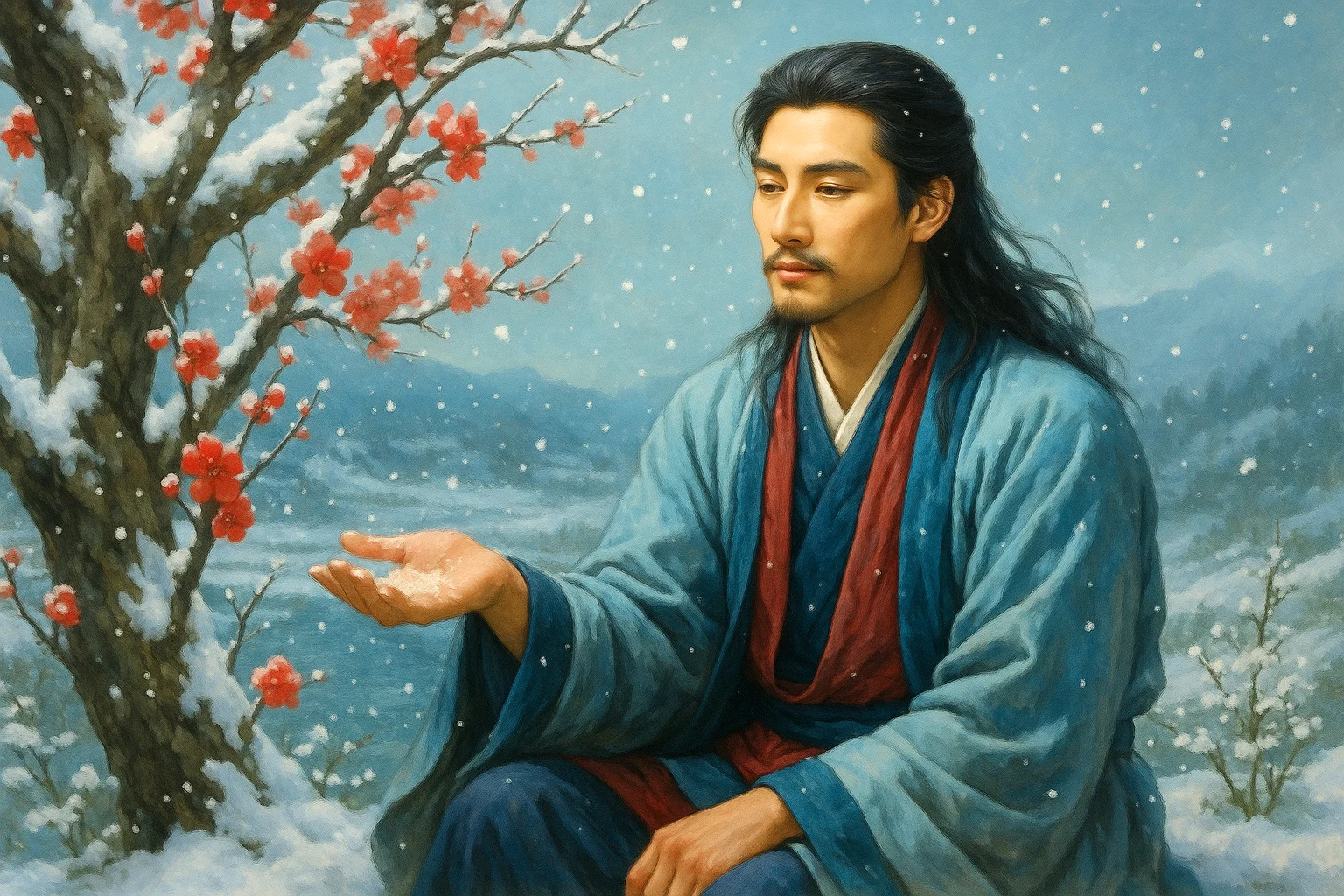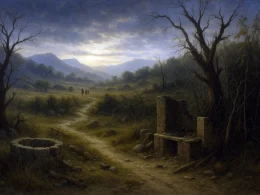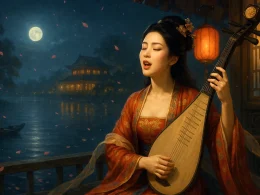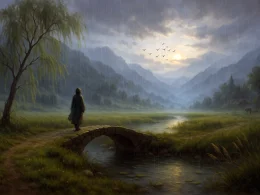Swallows and wild geese, free of care,
West of Taihu Lake, chase clouds through air.
Peaks stand austere, their outlines bare -
Whispering plans for twilight rain to share.
By the Fourth Bridge's aging stones,
I'd dwell with Sky-Follower, left alone.
Now what remains? Leaning on rails,
Ancient thoughts rise as withered willows flail.
Original Poem
「点绛唇 · 丁未冬过吴松作」
姜夔
燕雁无心,太湖西畔随云去。
数峰清苦。商略黄昏雨。
第四桥边,拟共天随住。
今何许。凭阑怀古。残柳参差舞。
Interpretation
Composed in the winter of 1187 during Emperor Xiaozong's reign, this ci poem was written by Jiang Kui while traveling between Huzhou and Suzhou, passing through Wusong (modern Wujiang, Jiangsu). Wusong was the hermitage of Lu Guimeng, the recluse poet of the late Tang dynasty whom Jiang Kui deeply admired, making this site particularly evocative for him. According to The Chronicle of the White Stone Daoist, this work was also inspired by Fan Chengda's farewell poem during Jiang's return journey, imbued with profound personal resonance.
First Stanza: "燕雁无心,太湖西畔随云去。数峰清苦。商略黄昏雨。"
Yàn yàn wú xīn, Tài Hú xī pàn suí yún qù. Shǔ fēng qīng kǔ. Shāng lüè huáng hūn yǔ.
The northern geese, free of worldly care,
Follow clouds past Taihu's western shore.
A few peaks stand stark and bare,
Whispering of dusk's impending pour.
The stanza opens with "geese free of worldly care" (燕雁无心), using migratory birds as metaphors for the poet's own rootless existence, while also echoing Lu Guimeng's poetic sensibility. The description of Taihu's western shore and the "stark peaks" at dusk blends literal scenery with profound personal reflection. The verb "whispering" (商略) personifies the mountains, as if they share in the poet's contemplations, merging scene and emotion seamlessly.
Second Stanza: "第四桥边,拟共天随住。今何许。凭阑怀古。残柳参差舞。"
Dì sì qiáo biān, nǐ gòng Tiān Suí zhù. Jīn hé xǔ. Píng lán huái gǔ. Cán liǔ cēn cī wǔ.
By the Fourth Bridge, I long to dwell
With Tiansui in his hermit cell.
Where are you now? I lean and sigh,
Gazing past as broken willows dance against the sky.
"The Fourth Bridge" (第四桥) was Lu Guimeng's former haunt, and "Tiansui" (天随) was his poetic name. Jiang Kui feels a deep spiritual kinship and yearns to commune with him across time. "Where are you now?" (今何许) marks the emotional climax of the poem—three simple words that encompass profound questioning of the era, personal fate, and history itself. The closing image of "broken willows dancing" (残柳参差舞) symbolizes the Southern Song dynasty's precarious state and mirrors the poet's own desolate circumstances, conveying a somber, far-reaching melancholy with restrained elegance.
Holistic Appreciation
Though composed of merely forty-one Chinese characters, this ci poem progresses layer by layer—from depictions of nature to remembrances of ancient figures, then to lamentations of the present—its emotions undulating and its意境 profound. Through the lens of Wusong’s historic sites, Jiang Kui expresses reverence for Lu Guimeng and resonates with the latter’s life circumstances, embedding stirring emotions within tranquil scenes and profound contemplation within scenic descriptions. The pivotal question, “What now remains?” encompasses reflections on the cosmos, history, and human existence, elevating the entire poem to a philosophical height and making it one of the most intellectually profound works among Southern Song ci poetry.
Artistic Merits
- Emotion Woven into Scenery, Fusion of Feeling and Scene: Natural landscapes—Lake Tai, dusk, withered willows—all mirror the poet’s inner turmoil.
- Interplay of Real and Imagined, Language Rich in Meaning: Phrases like “I longed to dwell with Tian Sui” and “What now remains?” are suggestive, inviting boundless contemplation.
- Bridging Past and Present, Aligning with Ancient Sages: By comparing himself to Lu Guimeng, Jiang Kui transcends temporal barriers, embodying deep cultural identification and spiritual emulation.
Insights
This ci poem illustrates how a literatus, even amid displacement and turmoil, clings to the pursuit of an ideal persona and the steadfastness of cultural conviction. Confronting the decay of reality, the poet draws strength from history and nature, reflecting on the present through an aesthetic lens and leaving behind a spiritual resonance that transcends time. It reminds us that true nobility lies not in fleeing worldly affairs but in preserving clarity and dedication even amidst life’s storms.
About the poet

Jiang Kui (姜夔, c. 1155 - 1221), a native of Poyang, Jiangxi, was a Southern Song Dynasty lyric poet and musician. He remained a commoner throughout his life. His lyrics are known for their ethereal and austere style, and his poetry is also highly regarded. Along with Fan Chengda and Yang Wanli, he is celebrated as one of the "Four Great Masters of the Restoration."












